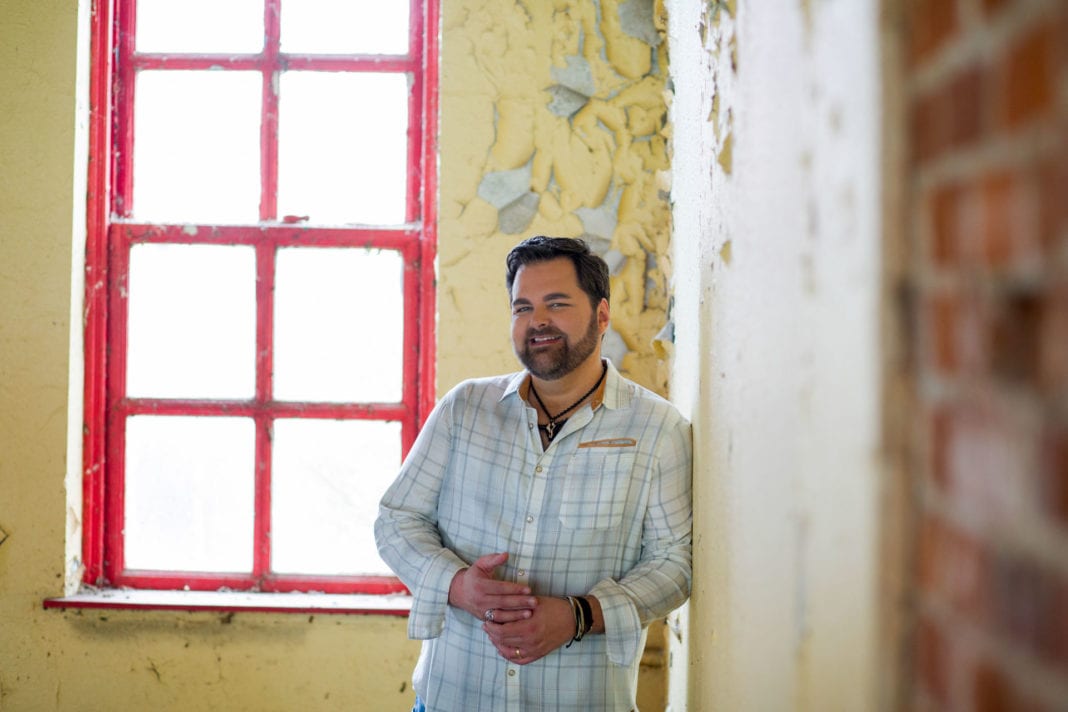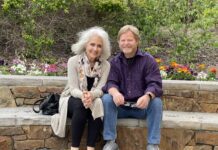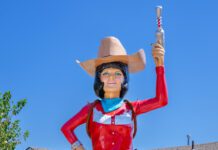On a morning not long ago, as James Robert Webb sat gazing out his hotel room window at the Nashville skyline, he found himself recalling another room, another view, and another time. The memory came from a couple of decades earlier in his life, back when he was a student at Oklahoma Baptist University in Shawnee.
“My friends and I had a band,” he says. “We were playing in side bands and playing at the university level, too, in the symphonic band and jazz band, and we were backing the people who were doing the big fall talent show at OBU. One evening, one of those people said to me, ‘You’re really good. Have you ever thought about going to L.A. or Nashville?’
“I can remember sitting by the window in my dorm room, looking out at the setting sun, and saying something to the effect of, ‘Yeah, I really love music. But I’d like to have a family someday, and I know that musicians don’t make a lot of money. You struggle a lot.’
“That was the crossroads,” he adds. “It’s a moment in my life that I come back to. It’s hard to predict success, and ‘success’ can mean different things, but having the tenacity to spend 13 years in training after high school – I think if I’d applied that differently, I would’ve been a successful songwriter-artist.”
Instead, after that 13 years he became a successful medical doctor. He currently runs his radiology practice out of Tulsa – where, he notes, “I get to help people, and that’s hard to beat. I’m in a niche where I actually get to help people every day. That’s really rewarding to me.”
That does not mean, however, that his musical path remained forever untaken. It was only postponed – albeit for quite a few years.
As it turns out, Webb was in that Music City hotel room recently because, later on that day, he’d be in a recording session with the famed record producer Buddy Cannon and a studio full of Nashville cats, taking another step in his progression toward genuine country-music stardom.
Webb’s story is an unusual one, if only because there haven’t been that many physicians who’ve also pursued serious careers in music. (The most recent one of national note, Virginia-based cardiologist Cleve Francis, charted some minor country hits in the early ‘90s.) The exigencies of a life in medicine make it tough for doctors to do much of anything else, and when a family is thrown into the mix, the notion of a second career seems, if not downright ludicrous, then certainly improbable.
“I know I have to keep my health intact, and I’ve got to keep my medical practice, and I’ve got to keep my family. And then
it’s my music.”
Still, James Robert Webb is giving it a real shot.
“It’s a balancing act, and I don’t know how good I am at balancing, but I do know that it’s got to be first things first,” he explains. “The medicine cannot suffer. That’s priority number one. And then, I try to keep family time at number two – like everybody else, though, I’m not always successful at that.
“I know I have to keep my health intact, and I’ve got to keep my medical practice, and I’ve got to keep my family. And then it’s music.” He laughs. “It’s not easy, but I enjoy it. That’s the only way you could do it. It’s the only reason to do it.”
Webb’s been enjoying music since his early youth, growing up on a farm outside of Kellyville.
“Some of my earliest memories are of listening to my parents’ eight-tracks,” he recalls. “Fleetwood Mac’s Rumours, Elton John. My dad was all country, and Mom listened to everything, so I had a lot of different influences at home. There was a piano in the house, and I remember, as a little kid – I couldn’t have been more than three or four – being enamored with the sounds it made.”
Like a lot of kids, Webb took piano lessons early in his life, but admits to never really developing his sight-reading skills to a high degree, always playing more by ear than by chart. Still, he kept on learning at the piano, even as he added new instruments to his repertoire.
“My dad got me a guitar when I was, I think, 14, and I spent a lot of my teenage years playing along to songs on KMOD, the rock station [in Tulsa], so I was self-taught that way. I gravitated toward percussion in junior high and high school, and then I was in the Kellyville jazz band. I was actually the All-State jazz piano player one year.”
It was during Webb’s student years, in the ‘90s, that Oklahoma artists began to leave what would become an indelible mark on the country-music scene, with the likes of Garth Brooks, Vince Gill, Ronnie Dunn and Reba McEntire rocketing to the top of the charts and selling out stadiums. They were an inspiration for Webb, even if he wasn’t planning a career in music at the time.
“Those are the people who did it for me in country,” he says. “That era of music is the last great golden age, I think, for country music. It was something new. There was a different energy. The lyrics were great, the music was exciting and you had these great artists.”
Thanks to his grandparents, who would tell him stories about Bob and Johnnie Lee Wills and the legendary Cain’s Ballroom radio broadcasts over Tulsa’s KVOO, he also knew about another notable Oklahoma contribution to popular music – western swing, which Webb has called “the world’s best antidepressant.”
So it’s hardly unusual that one of the first songs to get him noticed nationally was an unabashedly swinging version of “Tulsa Time,” the old Don Williams (country) and Eric Clapton (rock) hit.
“I knew I wanted to do a western-swing song,” he recalls, “because we had [fiddler] Joe Spivey and a couple of other Time Jumpers [the Nashville-based western-swing band] on the session. So Buddy and I were talking about it, and thinking we might do something like [the Wills standard] ‘Take Me Back to Tulsa.’
“It was the first day of the session, and we hadn’t really settled on anything. Then, Buddy walks in with this gleam in his eye, hands me a piece of paper, and says, ‘What do you think about this?’
“It was ‘Tulsa Time.’ And I said, ‘Brilliant.’
“It really was perfect,” he adds, because some of what I like to do as an artist and producer is to take things and spin them 180 degrees.”
Although his peppy western-swing take on “Tulsa Time” came in for a significant amount of airplay – notably on SiriusXM’s Willie’s Roadhouse, Willie Nelson’s satellite-radio channel – Webb knows that country radio has generally been resistant to pure swing tunes. So, while he plans to record more western-swing music, he figures, given the realities of the industry, that’ll be more of a side project for him, done while he and producer Cannon continue to seek breakout contemporary-country hits.
“But,” he adds, “I’m really looking forward to doing it, and I’ve already got a few songs I’m considering recording through the lens of western swing. It’s happy music, upbeat, and it’s got everything that typical country music has – three chords and the truth, you know.
He laughs again, “And a lot of times with western swing,” he concludes, “It’s just two chords.”


























